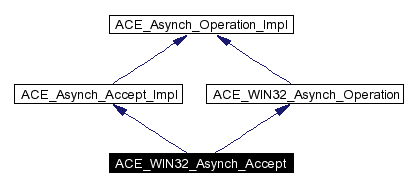
#include <WIN32_Asynch_IO.h>
Inheritance diagram for ACE_WIN32_Asynch_Accept:


Public Methods | |
| ACE_WIN32_Asynch_Accept (ACE_WIN32_Proactor *win32_proactor) | |
| Constructor. | |
| int | accept (ACE_Message_Block &message_block, size_t bytes_to_read, ACE_HANDLE accept_handle, const void *act, int priority, int signal_number=0) |
| ~ACE_WIN32_Asynch_Accept (void) | |
| Destructor. | |
| int | open (ACE_Handler &handler, ACE_HANDLE handle, const void *completion_key, ACE_Proactor *proactor) |
| int | cancel (void) |
| ACE_Proactor * | proactor (void) const |
| Return the underlying proactor. | |
Once <open> is called, multiple asynchronous <accept>s can started using this class. A ACE_Asynch_Accept::Result will be passed back to the <handler> when the asynchronous accept completes through the <ACE_Handler::handle_accept> callback.
|
|
Constructor.
|
|
|
Destructor.
|
|
||||||||||||||||||||||||||||
|
This starts off an asynchronous accept. The asynchronous accept call also allows any initial data to be returned to the <handler>. Upto <bytes_to_read> will be read and stored in the <message_block>. The <accept_handle> will be used for the <accept> call. If (<accept_handle> == INVALID_HANDLE), a new handle will be created. <message_block> must be specified. This is because the address of the new connection is placed at the end of this buffer. Implements ACE_Asynch_Accept_Impl. |
|
|
This cancels all pending accepts operations that were issued by the calling thread. The function does not cancel asynchronous operations issued by other threads. Reimplemented from ACE_WIN32_Asynch_Operation. |
|
||||||||||||||||||||
|
Initializes the factory with information which will be used with each asynchronous call. If (<handle> == ACE_INVALID_HANDLE), <ACE_Handler::handle> will be called on the <handler> to get the correct handle. Reimplemented from ACE_WIN32_Asynch_Operation. |
|
|
Return the underlying proactor.
Reimplemented from ACE_WIN32_Asynch_Operation. |
 1.2.18
1.2.18